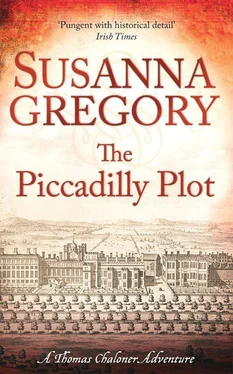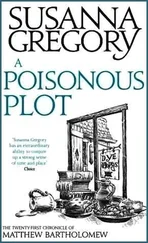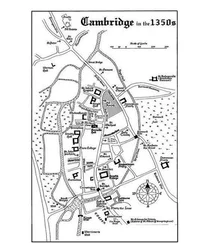Susanna Gregory - The Piccadilly Plot
Здесь есть возможность читать онлайн «Susanna Gregory - The Piccadilly Plot» весь текст электронной книги совершенно бесплатно (целиком полную версию без сокращений). В некоторых случаях можно слушать аудио, скачать через торрент в формате fb2 и присутствует краткое содержание. Год выпуска: 2012, ISBN: 2012, Издательство: Little, Brown Book Group, Жанр: Исторический детектив, на английском языке. Описание произведения, (предисловие) а так же отзывы посетителей доступны на портале библиотеки ЛибКат.
- Название:The Piccadilly Plot
- Автор:
- Издательство:Little, Brown Book Group
- Жанр:
- Год:2012
- ISBN:9780748121052
- Рейтинг книги:3 / 5. Голосов: 1
-
Избранное:Добавить в избранное
- Отзывы:
-
Ваша оценка:
- 60
- 1
- 2
- 3
- 4
- 5
The Piccadilly Plot: краткое содержание, описание и аннотация
Предлагаем к чтению аннотацию, описание, краткое содержание или предисловие (зависит от того, что написал сам автор книги «The Piccadilly Plot»). Если вы не нашли необходимую информацию о книге — напишите в комментариях, мы постараемся отыскать её.
The Piccadilly Plot — читать онлайн бесплатно полную книгу (весь текст) целиком
Ниже представлен текст книги, разбитый по страницам. Система сохранения места последней прочитанной страницы, позволяет с удобством читать онлайн бесплатно книгу «The Piccadilly Plot», без необходимости каждый раз заново искать на чём Вы остановились. Поставьте закладку, и сможете в любой момент перейти на страницу, на которой закончили чтение.
Интервал:
Закладка:
‘What news?’ called Farr, the owner, voicing the usual coffee-house greeting.
‘The Portuguese ambassador enjoyed having dinner with the King,’ offered Chaloner, repeating what he had read in the newsbook earlier. No one looked very impressed, so he added, ‘Afterwards, he skipped all the way from White Hall to St Paul’s, and one member of the Privy Council was so impressed by his elegance that he has engaged him as a dancing master.’
He expected everyone to know he was being facetious, but Farr nodded sagely. ‘The Portuguese are a strange nation. I am not surprised that one of them knows how to gyrate over long distances.’
‘ The Intelligencer did not report the prancing, though,’ said a young printer named Fabian Stedman, who spent so much time in the Rainbow that Chaloner wondered whether he had a home of his own — or a place of work, for that matter. ‘I do not know how it dares call itself a newsbook, because it never contains anything interesting.’
‘Well, what do you expect?’ asked the Rector of St Dunstan-in-the-West. Chaloner liked Joseph Thompson, a kindly, liberal man with a conscience. ‘The government is afraid that we will embark on another civil war if it tells us too much — this time to rid ourselves of King and Parliament, given that neither have proved themselves worthy to rule.’
‘There was a fascinating piece about a fish caught in the River Severn last week, though,’ said Farr. ‘Apparently, it was of great size and uncouth shape.’
‘Does that count as foreign news or domestic?’ mused Stedman. ‘The Severn is in Wales, which is a distant land full of heathens.’
‘Nonsense,’ argued Thompson. ‘I have been to Wales, and it is very nice.’
‘The farthest I have ever been is Chelsey,’ confided Farr. ‘And that was more than foreign enough for me! I was worried about being set on by footpads every inch of the way. Life is very dangerous outside the city.’
‘Have you ever travelled, Chaloner?’ asked Stedman. ‘You hold very controversial opinions, so I imagine you have. For example, you are always telling us that it is wrong to go to war with the Dutch, when the rest of the country cannot wait to start fighting.’
‘Hear, hear!’ cheered Farr. ‘I am thoroughly looking forward to trouncing the Hollanders at sea, and stealing all their trade routes.’
‘War with the Dutch is not a good idea,’ said Chaloner tiredly. He had lost count of the times he had tried to explain the reality of the situation to them. ‘They have faster ships, better-trained sailors, and mountains of materiel that will allow them to stay at sea for months. We do not.’
‘He is right,’ agreed Thompson. ‘Fighting Hollanders would be madness. Besides, they are a Protestant nation that was kind to the King when he was in exile. What purpose will conflict serve?’
‘They are taking slaves from Africa to work on their sugar plantations,’ argued Farr. ‘When we defeat them, we can do it instead, so we shall have cheap sugar — as much as we can eat.’
‘Excellent!’ declared Stedman. ‘Coffee is a lot nicer with sugar.’
Chaloner wondered whether that was why he had yet to acquire a taste for coffee: he did not use sugar, as a silent protest against the plantations. He knew his self-denial made no difference to the slaves, and it was impossible to avoid sugar in all its forms, but he persisted anyway.
‘The slave trade is a vicious, despicable business, and any good Christian should agree with me,’ declared Thompson, uncharacteristically vehement. ‘It is evil.’
‘It is a matter of commerce,’ argued Farr. ‘We need affordable sugar, and slaves are the best way to get it. Morality has nothing to do with-’
‘Of course it does!’ cried Thompson. ‘How can you condone snatching men, women and children from their homes, and forcing them to work for no pay, just so you can have sweet coffee?’
‘If I were an African, I would accept it as my lot,’ declared Farr. ‘The wealthy and powerful have always dominated the weak. God made us that way.’
‘He most certainly did not,’ yelled Thompson, outraged. ‘And if you ever say such a wicked thing again, I will … I will … well, I do not know what I shall do, but you will be sorry.’
Everyone stared at him. Thompson had never lost his temper with Farr before.
‘He is right,’ said Chaloner in the silence that followed. He rarely joined coffee-house debates, because he disliked the attention it earned him. However, this was a matter about which he felt strongly. ‘The slave trade is an abhorrent business.’
‘How do you know?’ pounced Stedman. ‘You appeared last week all brown and healthy after months of absence — which you still have not explained. You were clearly in warmer climes, so where did you go? Barbados? Jamaica? Is that why you hold forth about the slave trade?’
Chaloner was aware that everyone was regarding him with interest, and wished he had held his tongue. ‘Tangier,’ he replied, supposing there was no harm in telling them. His mission had not been secret, and an evasive answer might be more trouble than it was worth.
‘How unpleasant,’ shuddered Farr. ‘I understand it is a vile place, full of snakes and swamps.’
‘No, that is New England,’ countered Stedman. ‘Tangier is in the middle of a desert. The Portuguese were delighted to foist it on us, because it is hot and nasty. Is that not right, Chaloner?’
‘It is certainly hot,’ replied Chaloner, wondering how the Rainbow’s patrons came by such wildly inaccurate information. How could Stedman think Tangier was in the middle of a desert when it was being fortified a sea port?
‘I have been told it will be a useful slaving centre one day,’ said Farr. ‘But Thompson is glaring, so we had better discuss something else. How about this Collection of Curiosities near St Paul’s, which is the talk of the city? Has anyone been to see it? Apparently, it has an “Ant Beare” from Brazil on display. Where is Brazil, exactly? Is it anywhere near China?’
While Stedman obliged him with a lesson in geography, Thompson gave Chaloner a strained smile. ‘I am glad one of my acquaintances has proper views on the slave trade. I preached against it in my sermon on Sunday, but I do not think anyone listened. I have a bad feeling that we will follow the Portuguese into the business, simply because there is money to be made.’
‘Portugal is not a major factor in the trade any longer. Holland has supremacy now.’
‘But the Portuguese do continue to take slaves to Brazil,’ countered Thompson. ‘You should not ignore their role in this evil simply because the Dutch have surpassed them in wickedness. More to the point, did you know that the Adventurers transported more than three thousand people to Caribbean plantations last year? It is disgraceful, barbaric and … and wicked ! And it is not as if the Adventurers need more money. They are all fabulously rich already.’
‘Wealth seems to be one of those commodities that no one ever admits to having enough of,’ said Chaloner. ‘The more someone has, the more he itches to acquire.’
‘Yes,’ said Thompson caustically. ‘In my line of work, we call it greed.’
Night had fallen by the time Chaloner left the coffee house, a set of carefully forged documents in his pocket for Reyner — he had borrowed pen and paper from Farr, although it had not been easy to dissuade the other patrons from trying to see what he was doing. Many other pedestrians had hired linkmen — carriers of pitch torches — to light their way, especially north of Charing Cross, where fewer houses meant it was much darker. Chaloner did not bother, although it meant he was in danger of stumbling in potholes or treading in something unpleasant. There was another peril, too: two louts approached him with the clear intent of demanding his purse, but they backed away when his hand dropped to the hilt of his sword and they saw he was able to defend himself.
Читать дальшеИнтервал:
Закладка:
Похожие книги на «The Piccadilly Plot»
Представляем Вашему вниманию похожие книги на «The Piccadilly Plot» списком для выбора. Мы отобрали схожую по названию и смыслу литературу в надежде предоставить читателям больше вариантов отыскать новые, интересные, ещё непрочитанные произведения.
Обсуждение, отзывы о книге «The Piccadilly Plot» и просто собственные мнения читателей. Оставьте ваши комментарии, напишите, что Вы думаете о произведении, его смысле или главных героях. Укажите что конкретно понравилось, а что нет, и почему Вы так считаете.












